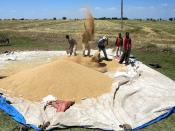Many people are displeased with their social standing, their job, or even their whole life. However, most of the time it is their personal problems that caused these troubles. Throughout the late 1800's, farmers became discontented with their way of life. While they had many reasons for their discontent, they had no validation in their discernment.
While there were many causes for agrarian discontent, problems with transportation and fiscal security created the most turmoil for farmers. The largest conflict of transportation stemmed from the lack of it. In small rural areas, many farmers had but one choice for transportation of their crops. Due to the lack of supply, demand and therefore cost of railroads significantly increased. Small farmers made very little to negative profits, due to these unreasonably high costs of shipping. However, they were forced to pay these costs or lose all of their hard work. Lack of transportation may have been a large problem for farmers, but their financial standing caused the greatest turmoil.
The farmers' financial discontent was created after being pushed into debt and forced to stay there. Many farmers attempted to start anew in order to have a better life. However, due to land speculation and new technology this caused massive debt for many new farmers. Land speculation provided the already wealthy another way to make a quick buck, while farmers must pay. Land speculation was not the only cause of massive debt, new expensive technology costed farmers a pretty penny too. With inventions to improve farming methods continually being produced, new farmers had trouble keeping up with big business farmers.
However, going into debt was not the farmers biggest concern, getting out was. Due to high tariffs and an increase of competition, it was nearly impossible to get out of debt. In order to increase national profit, the government increased tariffs, causing enormous costs to ship crops. The largest hurt on the farmers' fiscal well being was other farmers. The new technology allowed for massive production of crops. Due to this excess supply, cost of crops went down. To make up for low prices of crops, farmers began to produce more crops. It was a vicious cycle. However, even with all of these problems farmers had little validation for their discontent, because their largest problems stemmed from themselves.





![[Man in bill cap and dungaree coat, possibly a farmer] (LOC)](https://s.writework.com/uploads/9/90192/man-bill-cap-and-dungaree-coat-possibly-farmer-loc-thumb.jpg)